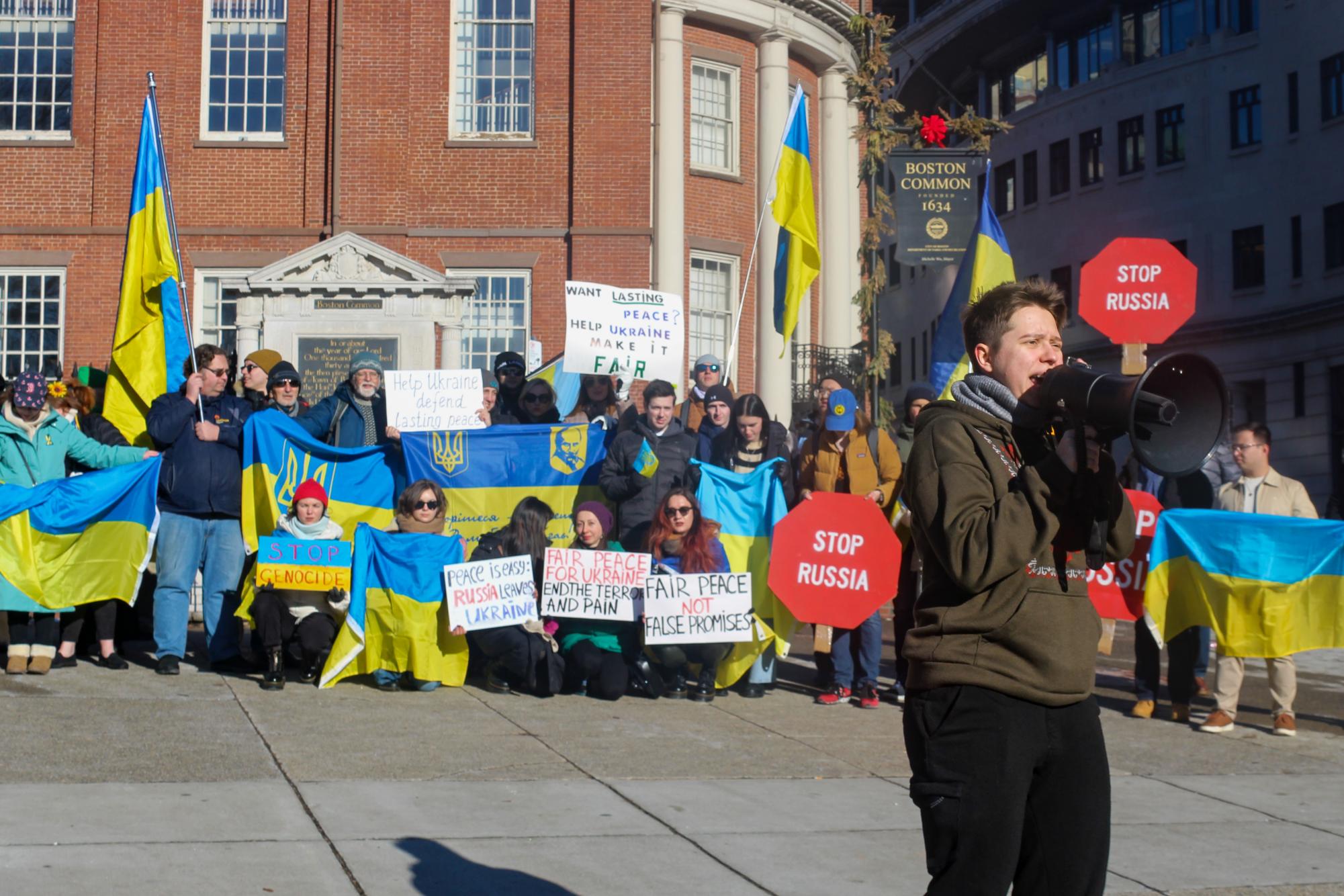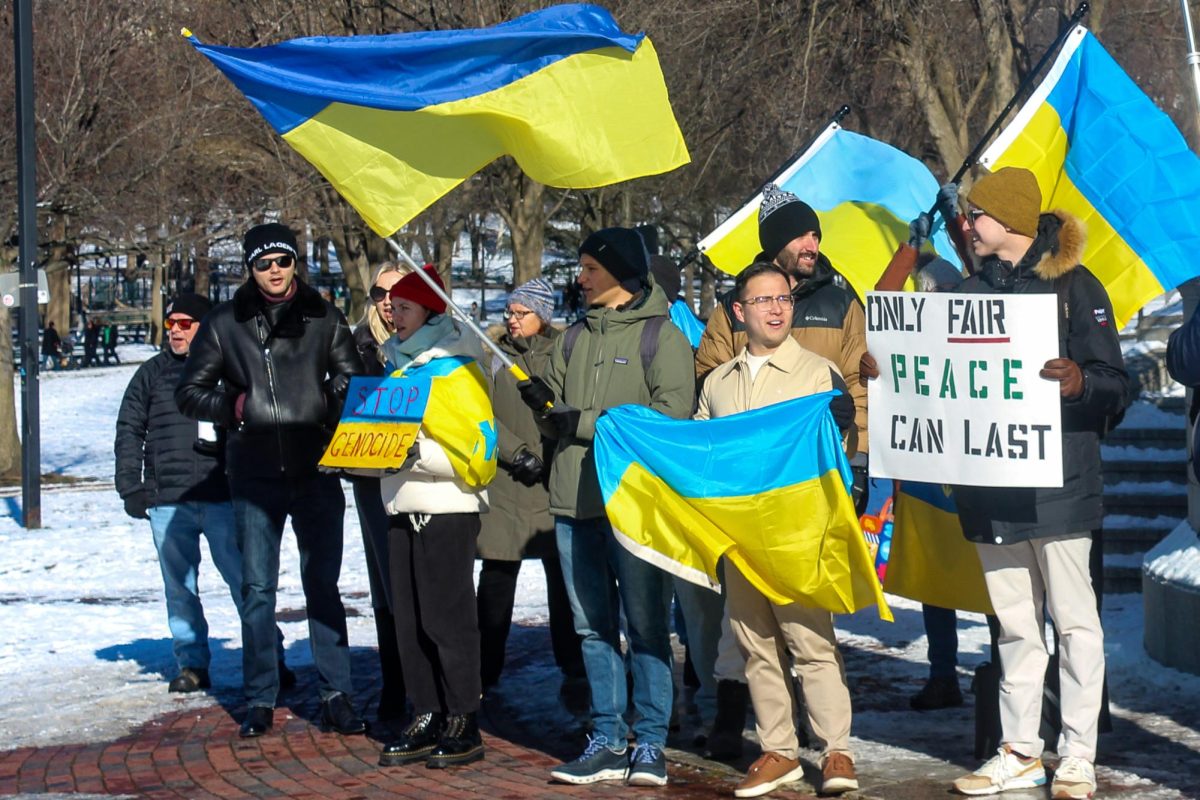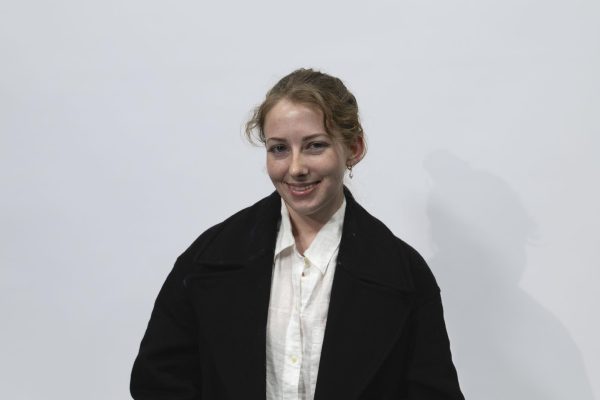Ukrainian activists and Boston residents gathered for a rally in Boston Common Jan. 12 to spread awareness about and advocate for an end to Russia’s full-scale war against Ukraine as it enters its third year.
The rally was part of a series organized by the New York-based organization Svitanok, along with similar events in New York City and Washington D.C. Among the demonstrators were Ukrainian refugees, university students from Ukraine and others who support an end to the war.
Sashko Horokh, a fourth-year mathematics and economics double major at the Massachusetts Institute of Technology, helped lead the rally. Horokh said the rally aimed to convey a vital message about the future of peace in Ukraine: Russia must completely withdraw from Ukrainian territory, and once it does, strong security guarantees must be instated for Ukraine. Only then, Horokh said, can Russian aggression cease in the present and be prevented in the future.
These demands were brought up by Ukrainian President Volodymyr Zelenskyy at a meeting of the Ukraine Defense Contact Group Jan. 9, where he also highlighted the need for foreign support as the inauguration of U.S. President Donald Trump, who spoke of decreasing U.S. aid for Ukraine, approaches. Horokh said the incoming administration is one of the reasons it was important to hold the rally.
“When the new administration comes in and starts their policy, we want them to already be aware of what we want, what our demands are and for other people to share that and hear us out, so that when the new administration starts to take actions in regard to Ukraine, it keeps in mind the important things,” Horokh said.
The Trump administration has already made claims about Ukraine, including numerous instances in which Trump said he would end the war in 24 hours. Keith Kellogg, Trump’s pick to lead the special Ukraine peace envoy, adjusted this projection in a Jan. 8 interview with Fox News where he extended that timeline to 100 days after the Jan. 20 inauguration. One of the organizers of the rally, Dasha Sakhniuk, said that while Trump’s claims might not be entirely realistic, there is still hope his administration will act in Ukraine’s interests.
“[Trump] has a strong personality,” Sakhniuk said. “If he gives up on Ukraine, he will look not so powerful as a president, man and leader. He mentioned that he was going to stop the war in 24 hours and then he mentioned that it will maybe take a little bit more time but he is still going to do it.”
Sakhniuk also said she believes Trump will end the war and hopes it will be in compliance with the demands Horokh identified.
“Trump is pushing Ukraine to make a peace agreement with Russia and we would like to have this agreement, but in our vision, we don’t want to give up any Ukrainian territory,” Sakhniuk said. “We are fighting for freedom and we cannot give up on this. We want to save our territory, we want to save our history, our country, our people. That’s why we’re here.”

Along with timing of the rally, organizers discussed the importance of the location. Sakhniuk described Boston as “the brain of the United States” due to the city’s prestige in higher education, research, law, medicine, business and more. Horokh said the presence of university students at events like the rally is uniquely valuable, especially in the long run.
“People who are right now in colleges are those who are most likely to have leading positions in the future,” Horokh said. “Some in 10 years, some in 20, some 50, but right now when they’re studying and learning things, hearing out Ukrainian perspectives might influence the way they learn things and the way they think about them.”
Artem Dinh, one of the demonstrators attending the rally, is a master’s student in cybersecurity and public policy at Tufts University who is highly involved in student activism for Ukraine. He said students should take special care to be aware of the war against Ukraine and all that comes with it.
“The message to students, especially, is that while Ukraine is not on their radar, it’s a very big war. It’s the biggest war in Europe since World War II, and the media might not do justice to amplify the scale and the impact of it,” Dinh said.
Fellow attendee Daniil Kozyrytskiy, who is currently involved in research at MIT Media Lab while on a gap year, said he worries American students pay less attention to Ukraine as American media coverage of the war decreases.
“The war has been going on for quite a long time now and some people just don’t pay attention to it anymore and the [U.S.] government is slowing down in terms of helping,” Kozyrytskiy said. “I feel that some Americans are very into their own country. Not like that’s bad, but for example, at the beginning of the war they were trying to help, but then they have less and less information and there is less and less helping.”
Dinh said that, while the war might feel far away as it is featured less in U.S. media, many things that are featured on U.S. news are fundamentally connected to Ukraine, which is important for Americans to recognize.
“What you see with inflation, what you see with fossil fuel, oil or gas prices, what you see with instability in the Middle East and potentially Asia, is all interconnected because a big war cannot just be a local war in this world,” Dinh said. “And if a big war just left there to keep going, one day it will come back to bite us.”
Though many of the demonstrators in attendance had a Ukrainian background, some, like Malden resident Clara Anderson, joined the rally to support the cause despite having no ethnic connection to Ukraine. Anderson said that her empathy for the Ukrainian people prompted her to take up activism for Ukraine.
“When the war started, Ukrainians were just going about their day, just like I was. And then suddenly, [imitates an explosion noise],” Anderson said. “I imagine if that were me, I’d want someone to care.”
Vladislav Shapiro, a security expert and former Northeastern professor, emphasized this awareness must be continued through and after the next four years of Trump’s presidency, as the threats posed by Russia will not disappear with the end of the war.
“Trump will be president of the United States for maximum four years. How long [Vladimir] Putin will be president of Russia, even Putin doesn’t know,” Shapiro said. “It’s very easy for him to freeze the line, wait four years until Trump is over and start again.”
Shapiro also emphasized the value of culture in Ukraine’s victory. Shapiro is involved in the Ukrainian Culture Initiative, which exhibits and sells Ukrainian art in the United States and sends all profits back to Ukraine. As he put it, the power of art and culture is something global politics can never take away.
“In my opinion, the beauty and the culture will prevail, not guns,” Shapiro said. “Guns are temporary. Culture is not.”
Anderson said that along with continuing to care about the Ukrainian people, non-Ukrainians like her should remember that no matter how the war unfolds, it will affect them directly.
“The future of Ukraine affects everyone, not just Ukraine,” Anderson said. “If Russia is allowed to get away with this, they won’t stop.”








![A demonstrator hoists a sign above their head that reads, "We [heart] our international students." Among the posters were some listing international scientists, while other protesters held American flags.](https://huntnewsnu.com/wp-content/uploads/2025/06/image12-1200x800.jpg)


